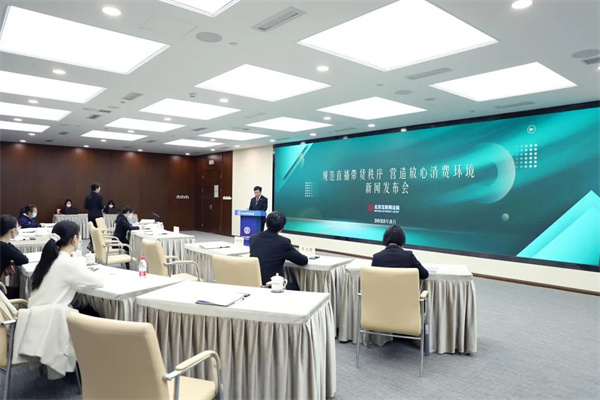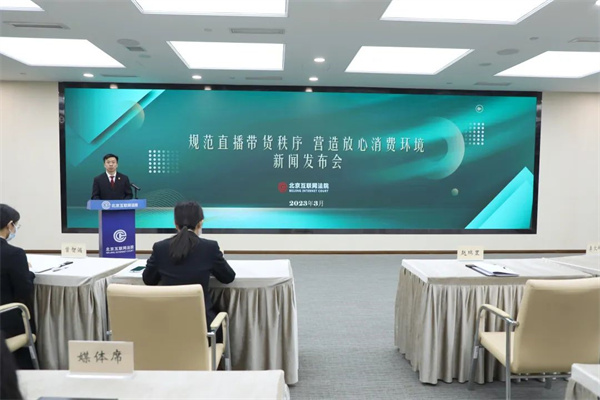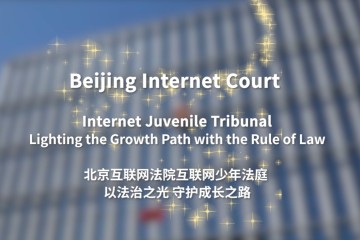BIC briefs consumer rights protection in livestreaming e-commerce
On March 16, the Beijing Internet Court (BIC) held a press briefing on consumption disputes in livestreaming e-commerce, in order to regulate the industry and create a healthy consumption environment.

The Beijing Internet Court (BIC) holds a press briefing on consumption disputes in livestreaming e-commerce on March 16. [Photo/Beijing Internet Court]
The BIC's trials on such cases in the last three years, their characteristics, adjudication rules, and typical cases were introduced at the meeting, which also offered suggestions on how to properly resolve such disputes.
Over the past three years, the BIC has accepted over 300 cases related to livestreaming sales. Aside from traditional e-commerce platforms, a large number of the cases, 158 cases specifically, involved livestreaming platforms.
In terms of subject matter of the cases, a wide variety of goods wereinvolved, ranging from physical products to virtual services, and from material needs to spiritual needs. In terms of litigation entities, livestreaming sales usually involve multiple parties, including the platform operators, the operators and hosts of the livestreaming rooms, the trading platforms, the stores, and the brand holders. Consumers often choose to list all parties involved as defendants, resulting in the entities involved becoming increasingly complex.

Zhao Ruigang, vice-president of the Beijing Internet Court hosts a press briefing on consumption disputes in livestreaming e-commerce on March 16. [Photo/Beijing Internet Court]
In terms of litigation, class action lawsuit tends to occur when the livestreaming sales volume of individual products is high while there are quality problems with the products. The time sensitivity of livestreaming makes it difficult to retain evidence, and the consumers’ ability to provide evidence is weakened, requiring the cooperation of the livestreaming platforms to provide video evidence. Also marketing methods often involve exaggeration and playing on the edge of the rules. Risks brought by speculative trading were particularly mentioned, which mostly occur in the trading of antiques or raw stones. Due to a lack of professional knowledge and identification abilities, ordinary consumers are prone to disputes after making impulsive orders. Main reasons for such disputes are the difficulty in determining responsibility due to the diversity of livestreaming subject identities, the low threshold for livestreamer admission and a lack of legal awareness, and the lax management of the platforms due to limited governance capability.

Liu Shuhan, presiding judge of the 2nd Comprehensive Division of the Beijing Internet Court briefs trials on consumption dispute cases in livestreaming e-commerce on March 16. [Photo/Beijing Internet Court]
To properly solve disputes arising from livestreaming sales, the BIC proposed to establish a diversified dispute resolution system to promote the prevention and resolution of disputes, and fully leveraging the regulatory advantage of administrative organs, the experiential advantage of industry associations, the data advantage of livestreaming platforms, and the adjudicative advantage of judicial organs. They also recommended that livestreaming platforms strengthen their management, improve the qualification review for entry into the livestreaming industry, the real-time monitoring of livestreaming rooms, and their dispute resolution mechanisms.

Li Wenchao, judge of the 2nd Comprehensive Division of the Beijing Internet Court releases typical cases on consumption disputes in livestreaming e-commerce on March 16. [Photo/Beijing Internet Court]
Five typical cases were released at the press briefing, which clarified the rules for adjudicating disputes in the field of the livestreaming sale of second-hand digital products, jade and other raw stone materials, and luxury jewelry, and regulated non-standard behaviors such as the failure to disclose seller information and the failure to truthfully inform consumers of product defects in livestreaming sales.

 Judicial White Paper
Judicial White Paper
 Play
Play Play
Play Online Lawsuit Guide
Online Lawsuit Guide Beijing Internet Court Lawsuit Service WeChat Account
Beijing Internet Court Lawsuit Service WeChat Account  Beijing Internet Court WeChat Account
Beijing Internet Court WeChat Account